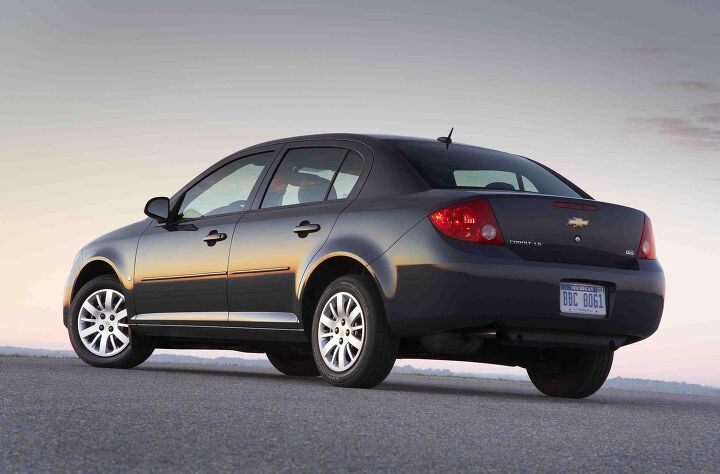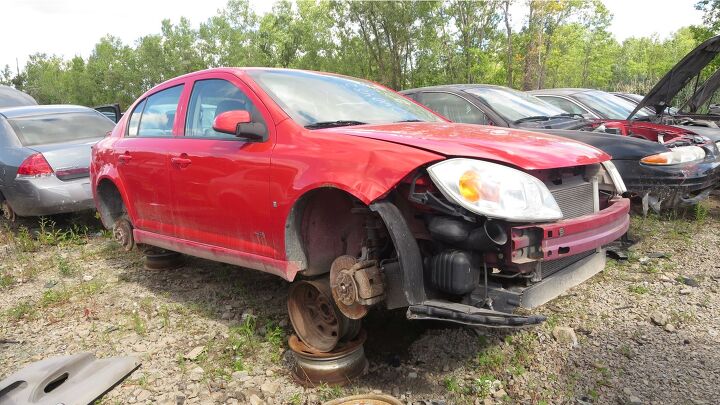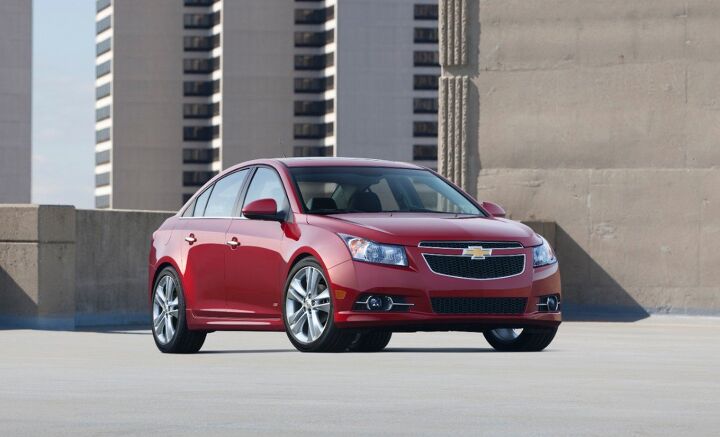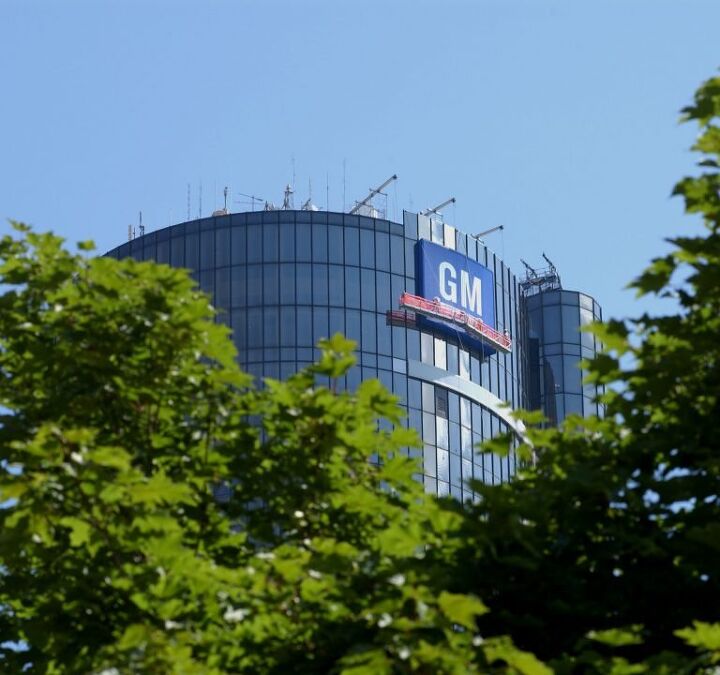#cobalt
GM Secures Itself Some Cobalt
Automotive manufacturers are currently on a quest to secure supply chains to avoid any future embarrassments relating to absent materials or missing components. If the last few years have taught the industry anything, it’s that it is always better not to get caught with your pants down. So we’re now seeing most of the major players trying to lock down raw materials necessary for battery production as they pitch upward in value in anticipation of numerous firms transitioning to all-electric vehicles.
Cobalt has been of particular interest to automakers and General Motors recently entered into a formal agreement to purchase the chemical element from the Anglo-Swiss commodities trader Glencore Plc.
Buy/Drive/Burn: Basic American Compacts From 2008
We continue our 1990s-then-2000s series today, following up the last post that featured compact American two-doors from 1998. By the late 2000s, the Escort, Neon, and Cavalier were all dead. In their place were the Focus, Caliber, and Cobalt, and not all of those had a two-door variant. That means we focus on four-doors today. Let’s go.
Junkyard Find: 2007 Pontiac G5 GT Coupe
While General Motors may have developed an alarming rod knock during the middle 2000s, culminating in Chapter 11 bankruptcy in 2009, The General’s Pontiac Division was shooting rods through the hood by 2007 or so. Oh, sure, the Solstice gave us all hope for the marque that gave us so many great machines over the decades, but few felt optimistic about Pontiac by the time the G5 hit showrooms for the 2007 model year. Here’s one of those first-year G5s, a Performance Red GT Coupe found in a Denver-area yard over the weekend.
Battery Prices Likely Heading for the Ceiling After Congo Raises Royalty Rate
The Democratic Republic of Congo has declared cobalt a “strategic” substance, nearly tripling the royalty rate miners will have to pay on it. According to a governmental decree, miners will now pay 10 percent in royalties to extract the element.
While we’ve previously warned of the likelihood of a global supply shortage elevating the price of batteries, it seems this will occur only after the Congo taxes the crap out of it. This is the second time cobalt has seen a royalty hike since June, when the region increased the previous 2 percent royalty to 3.5 percent.
Besides the looming prospect of a reversal in the falling price of EV batteries, a spike in the price of cobalt is already ruffling some feathers.
Battery Entrepreneur Claims Breakthrough, Reducing Need for Controversial Cobalt
While electric vehicles get better every year, they remain beholden to battery technology. This results in a few inherent shortcomings – the most noteworthy being limited range and extended downtime while charging. While this has helped throw a wet blanket EV adoption, it isn’t the technology’s only fault. Modern car batteries are also dependent on relatively rare metals that are both morally contentious and prohibitively expensive to procure.
Cobalt, mined almost exclusively in the Democratic Republic of Congo, and often by children, is likely the worst offender. Prices skyrocketed after EV manufacturing went mainstream, and analysts have long predicted a shortage that could severely impact the long-term popularity of zero-emission vehicles. Fortunately, a new way to build batteries may be on the horizon, though this particular application could create as many issues as it solves – since it involves removing an element that’s paramount to a battery’s long-term stability.
The 'Electric Revolution' Can't Happen Without Cobalt, and We're Already Running Out
As we hurl ourselves into the the glistening, unknown future, we are continuously confronted with new obstacles. While we’re good at coming up with solutions to new problems, there are plenty of important questions left hanging in the air as technology pushes us onward. Why do we keep working longer hours as more things become automated? How to we ensure that sentient machines do not decide to kill us? Why are there still so many people that use the speaker function on their phones in public places?
In the automotive realm, autonomous driving and battery technology are the golden geese of progress right now. While driving aids are becoming ever-more impressive, truly self-driving cars are a little further out than most manufacturers would like to admit. Meanwhile, electric automobiles are already here and tangible as hell. You could have one tomorrow if you wanted.
The issues associated with autonomous vehicles are beyond complex. In addition to deciding how to develop the technology effectively, a myriad of questions exist as to the legal ramifications of its implementation and how its very existence could change society. Electric cars are more straightforward, and the problems they face are predominantly logistics oriented. But they’re about to face a monumental hurdle in a few years.
'Artisanal' Child Labor Business Booming, Thanks to Electric Vehicle Renaissance
Electric cars have been praised as the future savior of mankind for quite some time now, but only in the last few years have mainstream automakers promised to drive headlong into EV production. Governments around the globe encourage the transition. The reality of battery production isn’t so clear-cut, however. Unless you make your daily commute in a Mack truck, odds are good that swapping to a sparkly new four-door with a lithium-ion battery isn’t going to be better for the environment.
Currently, it takes substantially more energy to produce an electric car than a conventional internal-combustion model. EVs sourcing their energy from fossil fuel-burning power plants aren’t much better for the environment than something that runs off pump gas. In addition to that, defunct batteries have to be recycled or they become environmental hazards — and no one has quite figured out the best way to do that yet.
There’s also the issue of sourcing the materials for those batteries. EV cells need scarce precious metals like nickel and cobalt. Those materials take a lot of energy to harvest and have, unfortunately, led to an increase in child labor rates in Africa.
Junkyard Find: 2006 Chevrolet Cobalt SS
One thing about visiting wrecking yards in the Upper Midwest is that I know I’ll see interesting late-model General Motors cars.
I couldn’t find the elusive junkyard Saturn Ion Redline during my trip to Wisconsin in August, but I did find its Chevrolet cousin: a Chevrolet Cobalt SS, spotted in a Green Bay self-service yard.
Chevrolet Cruze: Success or Failure?
There was a time when the word ‘cockroach’ was the best way to describe any old Chevy compact.
GM to Pay $900 Million For Faulty Ignition Switch Cover-up
Two sources have told Reuters that the government will levy a $900 million fine on General Motors for its failure to recall and subsequent attempts to cover-up of faulty ignition switches linked to at least 124 deaths.
Criminal charges will be filed against GM for its role in hiding the defect from regulators, but will defer prosecution while the automaker complies with its penalty. The agreement is expected to be announced Thursday.
The massive fine is smaller than the $1.2 billion Toyota paid in March 2014 for its role in concealing that its cars could accelerate suddenly.
Piston Slap: Justy-fied Freestylin' Over CVTs, Part V
TTAC commentator Anomaly149 writes:
Sajeev, here’s one for you:
I have a CVT-equipped 2004 Saturn Ion Quad Coupe with ~140,000 miles. While you can write a book on the things that are weird with the car (key won’t release from cylinder sometimes unless you push this button inside the steering column, sometimes the neutral safety switch actuator machine-guns when stopped at a stoplight, it eats front sway links like it’s a contest, etc.), so far it’s been reliable and efficient.
Vellum Venom Vignette: The Brazil Vacation, Part II
A Captiva audience?
Aside from the car-less world of cruise/train travel, my post- CCS Design vacations involve seeing an American on the road only to feel their styling and (more importantly) proportioning are sleeker and prettier. Douchey perhaps, but it’s my benign contribution to American Exceptionalism.
Even if this “proper” Chevy is a German Opel (sold alongside many a Korean Daewoo) introduced in Frankfurt as the Antara GTC. Harley Earl may spin in his perfectly-proportioned grave…but I digress.
NHTSA: GM Has Enough Parts To Repair All Affected By February 2014 Ignition Recall
Do you or yours happen to own one of the models affected by the February 2014 General Motors ignition switch recall? The automaker finally has a replacement ready at your convenience.
Recalled GM Cars See Bigger Price Drop Over Other Used Vehicles
Are your children about to start college? Maybe it’s their senior year in high school? Looking for a cheap vehicle and don’t mind if it’s been recalled to death by its automaker? Then a vehicle caught up in the General Motors recall parade might be the one, as prices have fallen hard as of late.
GM Warned Of Rental-Car Crashes As Early As 2005
Several years prior to the February 2014 General Motors ignition switch recall, car rental companies did their best to get the automaker’s attention regarding a series of accidents and fatalities linked to the latter’s low-cost fleet offerings.





























Recent Comments